Only four months after the initial meeting in November last year as part of a startup delegation in São Paulo, the Swedish startup has recently completed a successful Proof of Concept with the cellulose giant in record time in the Southeastern region of Brazil.
Katam was among the 12 Swedish startups that participated in a delegation journey organized by Ignite Sweden and SISP to São Paulo, aimed at exploring opportunities in the Brazilian market.
The startup, established in Malmö in 2016, specializes in providing advanced forest management solutions through data-driven decision-making tools, employing cutting-edge technologies such as drones and AI algorithms.
During the in-person matchmaking session facilitated by Ignite Sweden during the visit, Katam was introduced to several leading forestry companies in Brazil. One of them was Melhoramentos, a pioneer in the Brazilian forestry industry, boasting a rich legacy spanning 133 years in the production of high-performance cellulose fibers for the tissue market.
“They had this specific demand that was basically our core business, so we can say it was the perfect fit,” recalls Forest Engineer, Luiza Federici, from Katam’s recently-opened office in Brazil, who participated in the meeting. “We talked with the people from the technical team during the meeting. I think that is the reason the project started so quickly and was successful, because they were the right people to discuss technology with.”
The Collaborative Proof of Concept
After the initial meeting, Katam was selected by Melhoramentos to talk more about project possibilities. In the beginning of 2024, the companies started with the planning and the organization of the three-month Proof of Concept (PoC) in the southeastern region of Brazil.
“The project consisted of a PoC to test our technology in their environment. In Brazil, each state has its own vegetation, climate, and biodiversity, including varying slopes. The idea was to test our technology in their specific scenario,” explains Luiza. The region poses challenges due to its abundance of slopes and native forests, coupled with high humidity, resulting in the proliferation of diverse vegetation that complicates measurement processes and data collection.
The project aimed to digitize forest inventory processes, minimizing human errors, enhancing data accuracy, and reducing field time.
“This has a positive impact on the planet because it reduces efforts, resources and, consequently, gas emissions. The goal is to minimize environmental impact, while lowering resources and costs, and improving precision,” says Luiza.
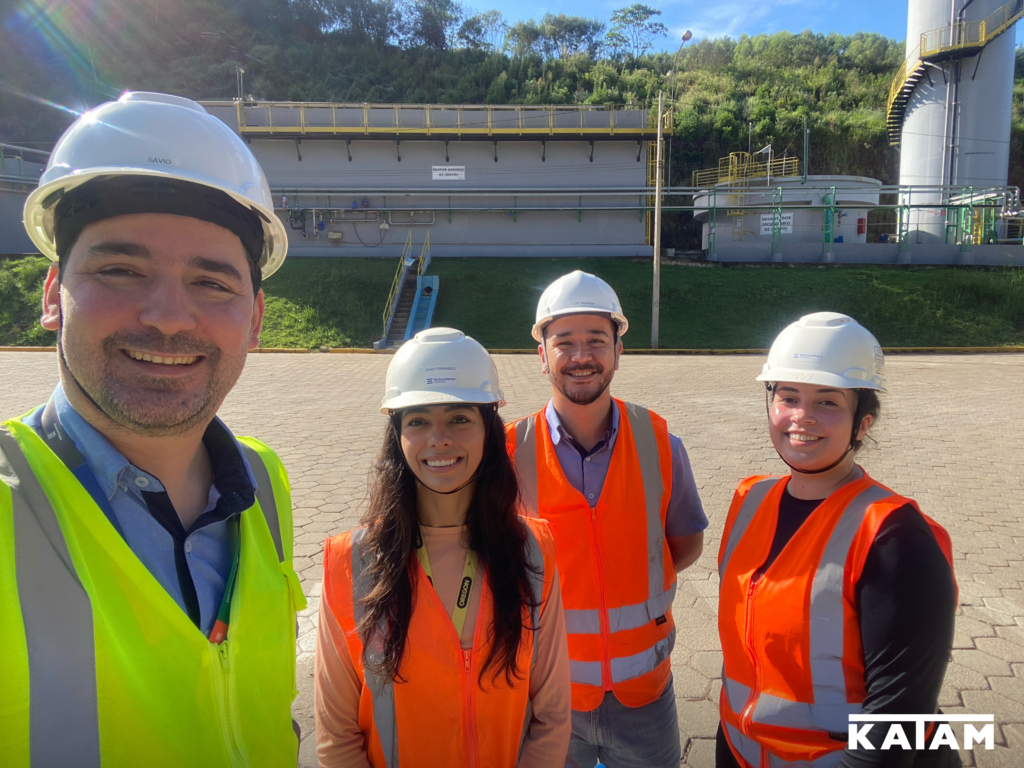
de Freitas and Luiz Mendes Takarada during field tests.
In March, Luiza Federici and her colleague Ana Carolina Schimaleski traveled to Minas Gerais to apply Katam’s technologies, demonstrating how it is possible to digitize processes and collect high-quality data in record time.
The PoC concluded in April, and Melhoramentos is currently internally validating the collected data. Luiza is hopeful that the next step will be the implementation of Katam’s technology.
Opportunities for Swedish Forestry Startups in Brazil
Brazil’s burgeoning forestry market presents a lucrative opportunity for Swedish startups like Katam. After many years working actively in the country, Katam established its Brazilian office last year, signaling its commitment to catering to the region’s evolving needs.
“The establishment of the new subsidiary exemplifies the company’s commitment to providing personalized customer support and facilitating the digital transformation of forestry management for its B2B clients in Latin America. The initiative is driven by our commitment to meeting our customers where they are and supporting them throughout their digital transformation journey. As Katam continues to grow in Latin America, we recognize the need for a dedicated local presence,” wrote their CEO, Magnus Karlson, in a press release.
Luiza Federici has been working with Katam in Brazil for three years, overseeing all the startup’s projects in the country. The company has established clients and ongoing projects in Brazil and South America.
According to Luiza, Brazil currently boasts a rapidly growing forestry market with substantial investment opportunities. Many large companies are expanding quickly, yet they lack the necessary resources and technology to facilitate this expansion seamlessly.
“Many companies don’t have enough people to measure all the forests they buy or to manage all the data they receive. Katam has technology capable of extracting much more data and in much less time than current methodologies. Our customers have more information about their plantations and their forests are more productive,” explains Luiza.
Sweden’s esteemed reputation in forest management serves as a valuable asset for Katam when engaging with Brazilian counterparts.

“Sweden serves as a significant reference for Brazilian companies. Saying that Katam is a Swedish company adds value when presenting our solutions to them,” says Luiza.
Navigating Challenges in the Brazilian Market
While Brazil presents a promising market for Swedish startups like Katam, it also poses unique challenges. Luiza advises fellow Swedish startups to tread cautiously, highlighting that understanding local dynamics and building robust business relationships are key.
“It’s a process, so you cannot rush things. I think that’s why Katam has been successful, because we understood that the market and the clients take time. But you need to be financially prepared to take and assume all the risks,” she advises.
Luiza emphasizes the importance of understanding the unique challenges and opportunities present in Brazil. “When Katam brought the technology from Sweden, they thought ‘it is just replicating what we are doing in Sweden’ in a homogeneous way,” she recalls. “But Brazil is huge, and the technology that you are bringing to the south of the country is different from the one you will bring to the north.”
“Swedish companies need to come to Brazil, be creative and do things from here if they want to succeed. Doing things only from Sweden it’s almost impossible,” she adds.
Despite these challenges, Federici sees immense potential in Brazil’s structured market and favorable regulatory environment. “There are many opportunities and the timing is perfect because the investment is very high at the moment. It’d be very nice for us to have other Swedish tech companies here to learn together and to knock the doors together,” she concludes.
Having met during Sweden Innovation Days 2022, Rexel Sweden and SustainLab joined forces to help the electrical technology distribution company transform their approach to sustainability reporting and data management.
Rexel faced the challenge of gathering, processing, and reporting on sustainability targets and environmental impact data effectively. Prior to meeting SustainLab, their annual sustainability reporting process was a tedious and time-consuming task.
“Like any other company we want and need to report our sustainability targets and our environmental impact. Every year in December, you have to start collecting all the data, which can be a hassle. We recognized that the process needed to be more efficient,” says Humaira Baneryd, Head of Sustainability at Rexel.
After identifying this innovation need, Ignite Sweden connected the company with startups developing technologies with the potential to solve this challenge. It was at Sweden Innovation Days 2022 when Rexel’s Innovation Manager digitally met Sustainlab, a startup that specializes in automating sustainability data flows within and beyond organizations. Their platform provides a seamless journey from data collection to data visualization and reporting.
Maria Svantemark, CEO and Co-founder at SustainLab, explained that their mission was to help companies make sustainability data collection less of a burden and, in turn, motivate employees to embrace sustainability initiatives by automating the data handling so they can spend less time reporting and more time accelerating change.
The Collaboration
The two companies found a shared vision together with a clear solution in Sustainlab’s offering for Rexel’s sustainability reporting challenges. With the implementation of SustainLab’s sustainability management platform, Rexel witnessed transformative changes in their reporting and data management processes.
“Because their sustainability data was spread throughout their organization and in very different formats, it was a challenge keeping track of the latest version of the data and the process of how it was actually being created,” says SustainLab’s Maria.
SustainLab’s solution addressed three key issues, including the scattered data that was consolidated and normalized, resulting in more consistent and reliable insights. The tedious data processing tasks were also automated, enabling employees to focus on more strategic aspects of sustainability. And finally, the platform facilitated flexible reporting, allowing customized reports for different departments, making sustainability data accessible and actionable across the organization.
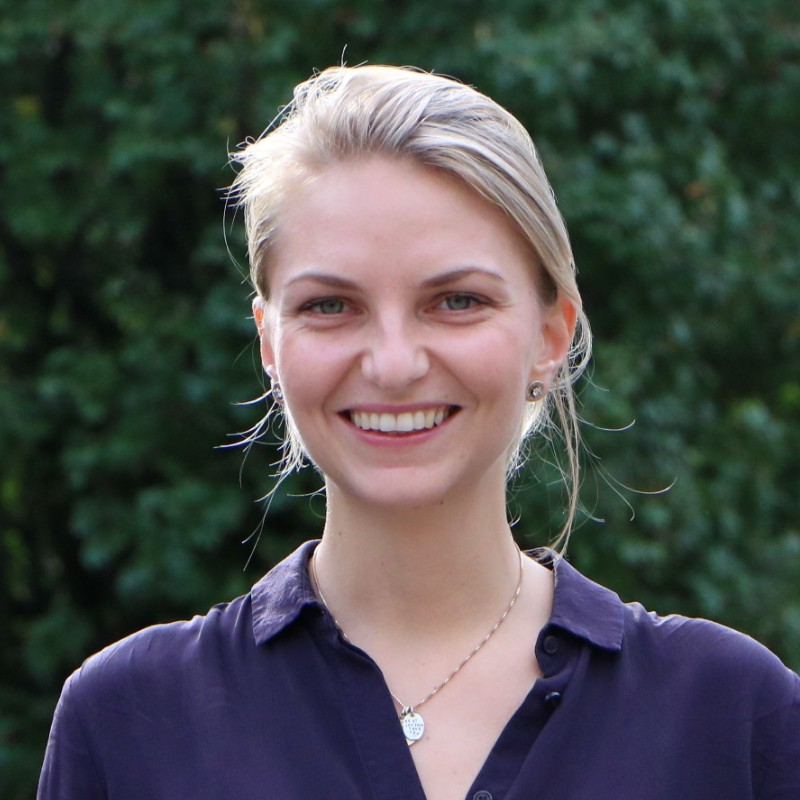
“It’s important to use this data when it’s new to actually drive your business forward in a more sustainable direction. The platform makes this easier as it can analyze thousands of data points in seconds and they can then use this in as many ways as possible,” adds Maria.
Learnings and Challenges
Throughout their collaboration, the two companies uncovered some valuable insights about working with each other.
The key learnings include the need for companies to be open to change and flexibility when collaborating with startups. Embracing innovation and taking calculated risks are essential for reaping the benefits of such partnerships.
“Even if we are taking a technical IT system, it doesn’t mean that we can just continue as normal. We have to change our processes in how we do things. So that takes time. But the good thing about working with a startup is that they’re very flexible and adjustable to your needs and what you want,” says Humaira.
For startups, Maria emphasizes the importance of crafting business models that ease collaboration with larger companies and provide value without demanding substantial upfront investments. This approach enables startups to build meaningful partnerships and drive impact together.

Rexel & SustainLab were awarded last year the Ignite Rapid Rollout for their outstanding collaboration.
About Rexel
Rexel are experts in multichannel distribution for the energy world, Rexel supports its professional customers with sustainable and innovative solutions, wherever they are.
About SustainLab
SustainLab is a Sustainability Management platform that automates the collection, processing and visualization of sustainability data.
After meeting through Ignite Sweden in 2020, ICA decided to support Saveggy in accelerating their time to market. Their collaboration, centered around an alternative to plastic in cucumber packaging, is now supported by Jordbruksverket and the European Union.
Reducing plastic waste is high on many companies’ agendas and is especially important for the fresh produce industry. When Swedish retailer ICA met with the startup Saveggy through Ignite Sweden in 2020, they immediately recognized the potential of their solution and decided to support Saveggy in accelerating their time to market.
Savveggy aims to help vegetables stay fresh for longer with an edible, plant-based liquid solution. For CEO Vahid Sohrabpour, their mission is clear.
“We wanted to provide a sustainable solution through the food value chain to reduce food waste, use less plastic and synthetic chemicals and help food stay fresh longer and reach more people,” he explains.
Sara Maxence, who worked for ICA at the time of the initial meeting and is now a consultant to Saveggy, recognized the potential but saw that they were still in the early stages of development.
“It is a very clever idea. I had seen similar solutions in California, but they were not allowed to be used on edible peels in the European Union. I was intrigued by the solution from the very beginning. If we can build upon the natural protections of the vegetable and make it better, then we don’t need any other protection, like plastic,” says Sara.
The Importance of Collaborating at an Early Stage
For Saveggy, who were at a very early stage at that time, the collaboration was very useful as it could help them accelerate their understanding of the market and its customers.
“We equally got guidance on initial product development and requirements from the industry,” says Vahid.
Sara adds that it was important to begin the collaboration at such an early stage as it provided benefits to both companies.
“For ICA, it was exciting to see how they could accelerate this innovative startup, gain insights into alternatives to plastic, and be part of a more sustainable future. Being able to share market knowledge and needs early felt very useful; we could help them find the right direction from the start,” says Sara.
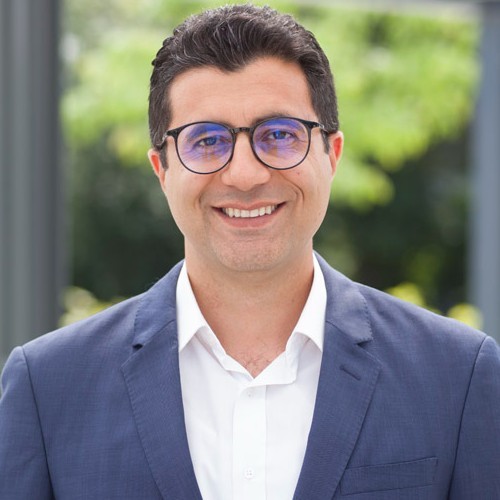
An On-going Collaboration
The collaboration between ICA and Saveggy is now supported by Jordbruksverket, the Swedish Board of Agriculture, and the European Union. Over the three years since its inception, extensive testing has been conducted to develop the technical solution and to better understand customer perceptions of the product.
After the initial meeting with the ICA innovation team, the experts within the team for fresh produce were brought into the conversation. Since then, the two organizations have met on a regular basis as part of ICA Växa, ICA’s own food innovation hub. Early on, it was decided to focus on cucumbers.
“Cucumbers are a good choice for this collaboration because they are wrapped in plastic, which is something the consumer is upset about, but without protection you wouldn’t be able to buy cucumbers in northern Sweden. From a logistics perspective it is also very efficient as cucumbers mainly go through an auction and are packed in one place,” explains Marcus Welin Sandgren, Senior Buying Manager FVF at ICA.
In the process, ICA’s customer base was used to evaluate the interest for innovations in the space.
“Our consumer studies have shown a curiosity and openness towards edible coating solutions that has exceeded our expectations which is a huge positive. We at ICA are constantly looking for ways to improve sustainability and minimize waste, so supporting Saveggy in this was an obvious choice for us,” says Marcus.
Collaborating Towards a More Sustainable Future
The good relations that the companies have developed over the years has helped Saveggy accelerate the development of their product.
“It has been a great forum to express new innovations in the process of product development and validate it in the supply chain”, says Vahid.
Sara acknowledges that she is looking forward to seeing coated products on the market in the coming year.
“It has been an interesting project and process to be part of from all perspectives. I strongly believe that we need to accelerate more collaborations in the food system to be able to transition to a more sustainable future,” concludes Sara.
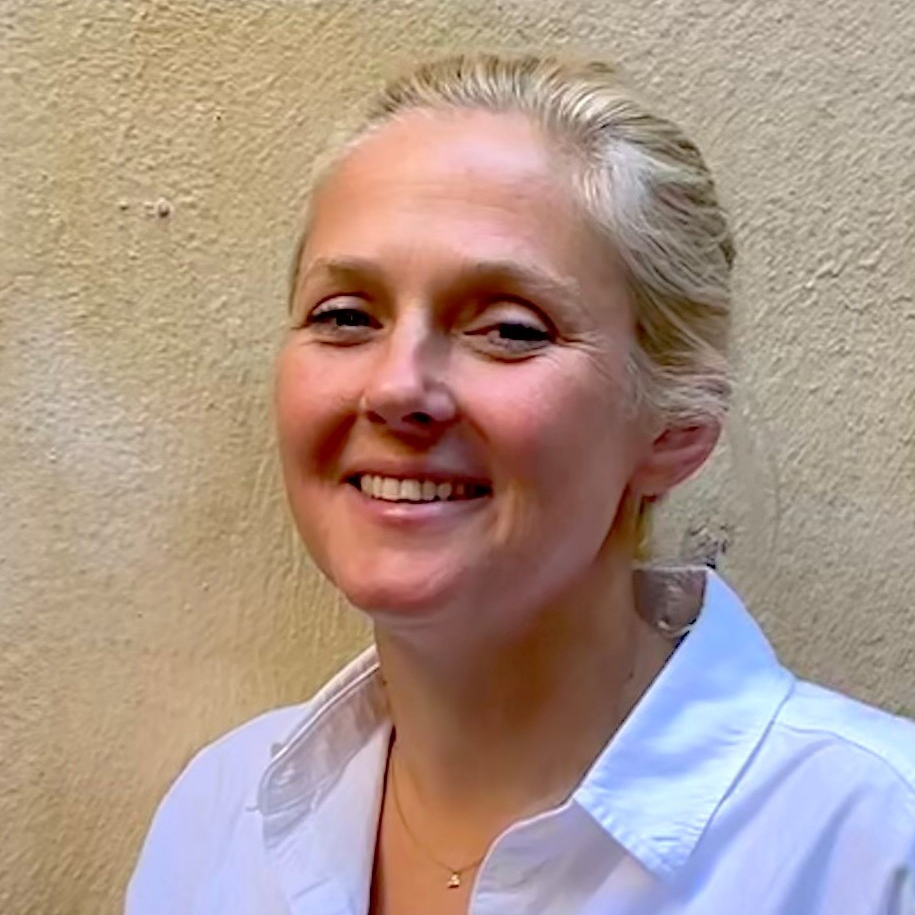
Find out more about this fantastic collaboration at this year’s Ignite Sweden Summit, where they will be sharing their successes, challenges and tips. Click here for more information and registration for the event.
Learn more about how Ignite has helped IBM foster numerous new startup collaborations including one with SiB Solutions.
In the fast-paced world of business and technology, forming fruitful collaborations and partnerships is essential to ensure ongoing innovation practices. For IBM, Ignite has been integral to facilitating ongoing meetings with startups.
In 2019, IBM began working with Ignite and have since participated in over two hundred meetings. This has led to many startups entering their accelerator program, developing and enhancing new innovative solutions together.
Finding startups through Ignite for their one-year accelerator program simply made sense according to Stefan Terelius, Client Engagement Leader at IBM.
“We needed someone who was working with lots of startups at a fairly early stage and vetting the companies,” he says.
“We could have hired freelance consultants in combination with access to databases and done cold calling, but we found a home here and really appreciated both the mission and the fact it is a nonprofit organization. It also added credibility to us to be vetted by Ignite; it shows we have a good process with the right mindset,” adds Urban Roth, IBM Innovation Studio Stockholm Leader.
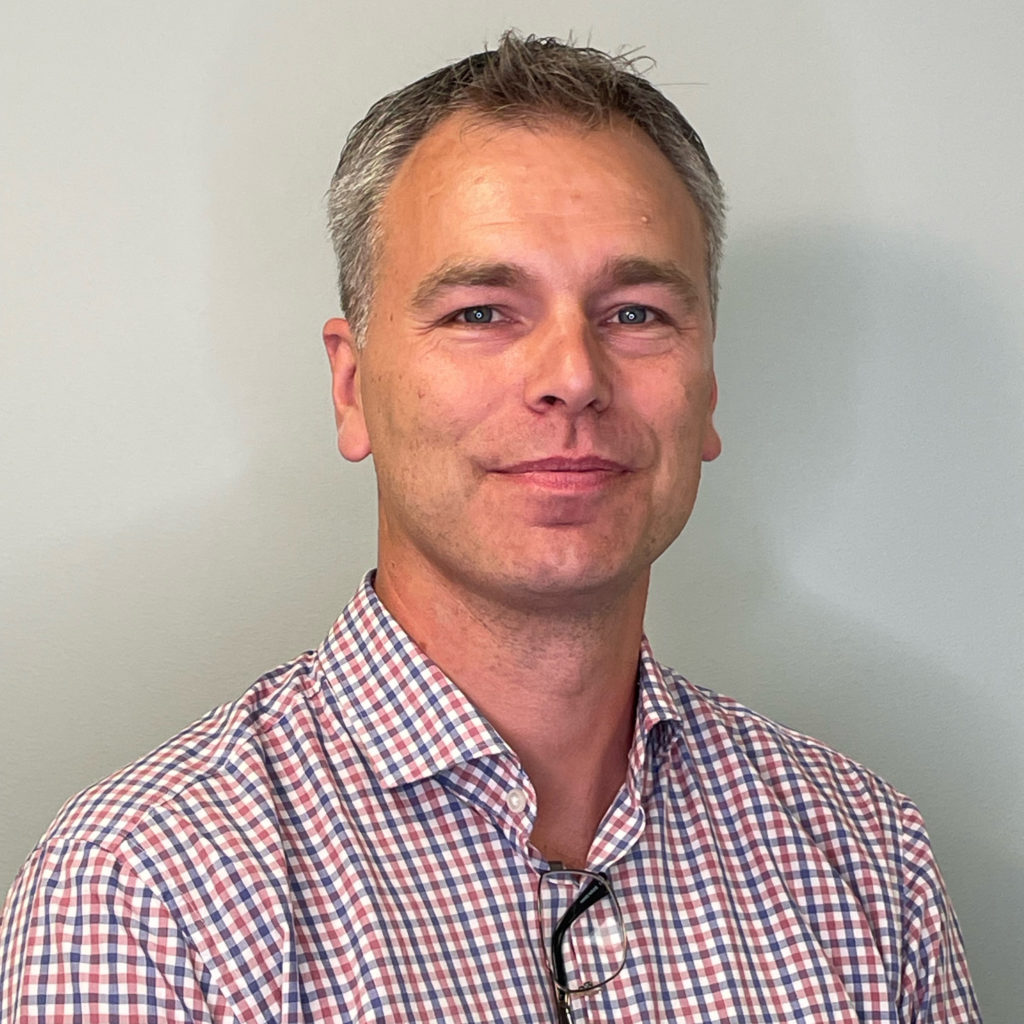
The process
According to Urban, the needs assessment process helps them choose the right startups beforehand, which allows them to make the most of the initial 20 minute meeting through Ignite.
From there, IBM has a well structured process that includes a series of in-depth meetings and evaluations, including a thorough examination of market fit, solution maturity, and the end-to-end business model. They also bring in other internal actors at an early stage to ensure that there is a need for the solution within the company, or wider innovation ecosystem. This method ensures that not only are the basic criteria met, but it also assesses the alignment of goals, strategies, and commitment from both parties.
When these are agreed upon, a formal agreement is set up with an NDA and clear letter of intent. “We set up clearly what we want to do, what we want to achieve and most importantly, the order in which we will do it. It’s basically three ninety day plans with a focus on the first one,” explains Urban.
At this point the work begins. The IBM program includes both a technical and business track.
“We are working with the technicalities such as how to create a platform that’s stronger, better, more flexible, with increased security, and possibilities to scale up or down. But we also look at the business side including how to sell, business strategy, which segments and clients to engage with, how to engage with clients, how to run a pilot, how to run the PSC, when to get paid, how to get paid and all those questions.
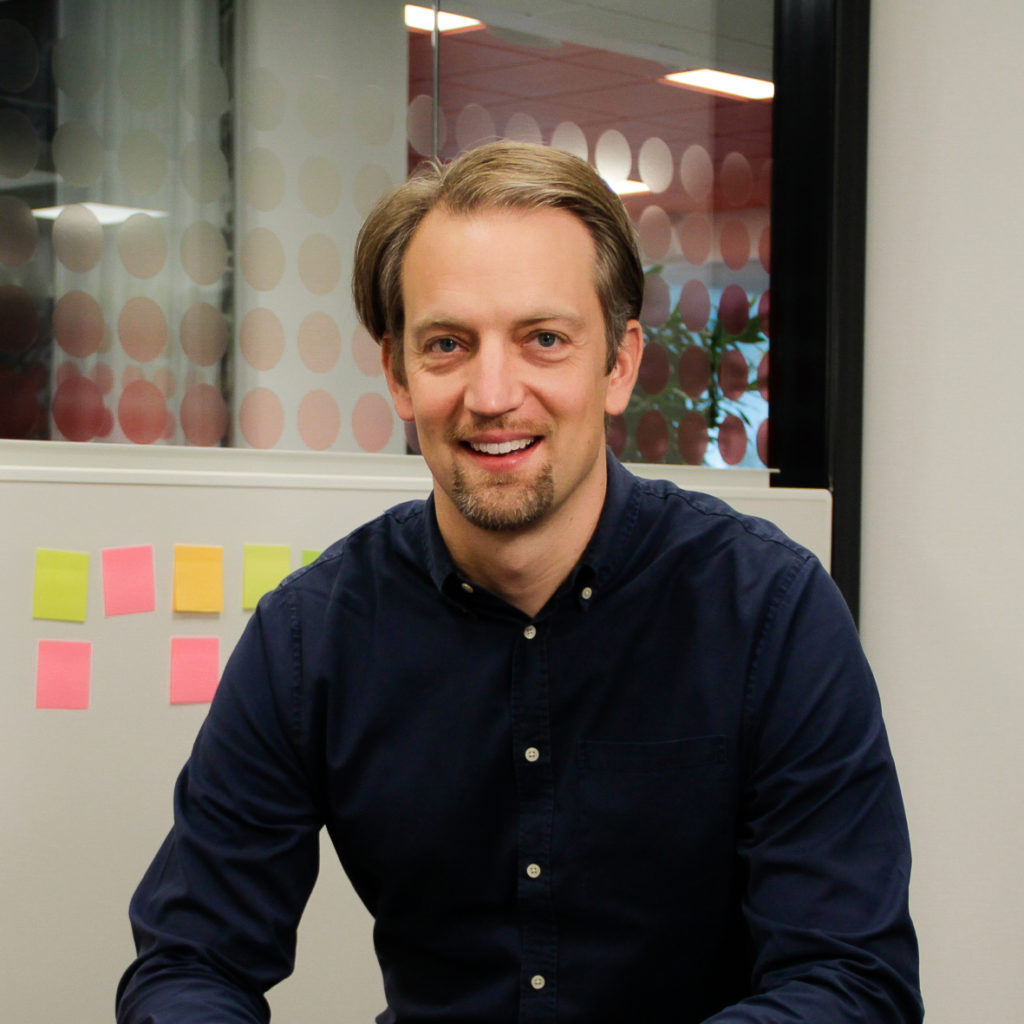
“And then a bit further in the process we also do some joint marketing and let the market know we are working together, and what’s the value of it. We reach out to other IBM partners seeking clients that are interested in this new combination of solutions and try to get the first commercial deal on the table. By then, we have usually reached the 12 month target,” says Stefan.
The program is cost and equity free, so its primary purpose is to act as a door opener for both the startups participating and IBM itself by designing commercial contract partnerships with those they work with.
“We provide startups internally into our ecosystem as assets that bring new conversations together with existing clients and existing organizations. This provides that opportunity for the startup founders but it can also create new conversations for IBM, which we wouldn’t have had otherwise,” says Urban.
For international companies looking to be on the cutting edge of their industries, working with startups is an obvious choice. The matchmaking at Sweden Innovation Days allowed corporates to meet innovative startups from the ten countries most suited to their specific needs.
A startup’s journey
One startup that has successfully been through this process is SiB Solutions who met IBM at an Ignite South event in 2020. The logistics technology startup made a crucially timed pivot to combine intelligent video analysis and AI into software that enables customers to compare their supposed goods flow to reality.
“We noticed a gap in the market and we were convinced that we could add some significant values to logistics-intensive companies. Our Intelligent Video and AI Services are subscription-based, and we include all the needed hardware and software so they only need to sign up and then enjoy the value,” says Stefan Borg, CEO, SiB Solutions.
For SiB Solutions, the reason they joined IBM was linked to their cloud computing capabilities.
“Our software is running on computers on site, but also in the Cloud. We previously had another vendor for this but IBM convinced us that they had a feasible option for us. Their approach to us was very gentle and service minded and they had a very good process to bring us on board,” says Stefan Borg.
From there, the two companies went through the technical assessments and processes required to see how they could work together and despite some delays due to the pandemic, Stefan says it was a positive experience.
“We set up to migrate to their cloud and they provided good support whenever we came across technical issues or challenges. They always acted as a good proxy and made sure we connected with who we needed to engage with and find a good solution.”
“And then at a certain point, we started to talk more and more about going to market collaboration, how did they see it with the marketing and that is still ongoing even now with activities that we can be involved in,” says Stefan.
This time in the accelerator has also provided them with a new partnership with Shibuya (who are part of the Pulsen Group) who introduced them as they knew that they would be a good fit for SiB Solutions.
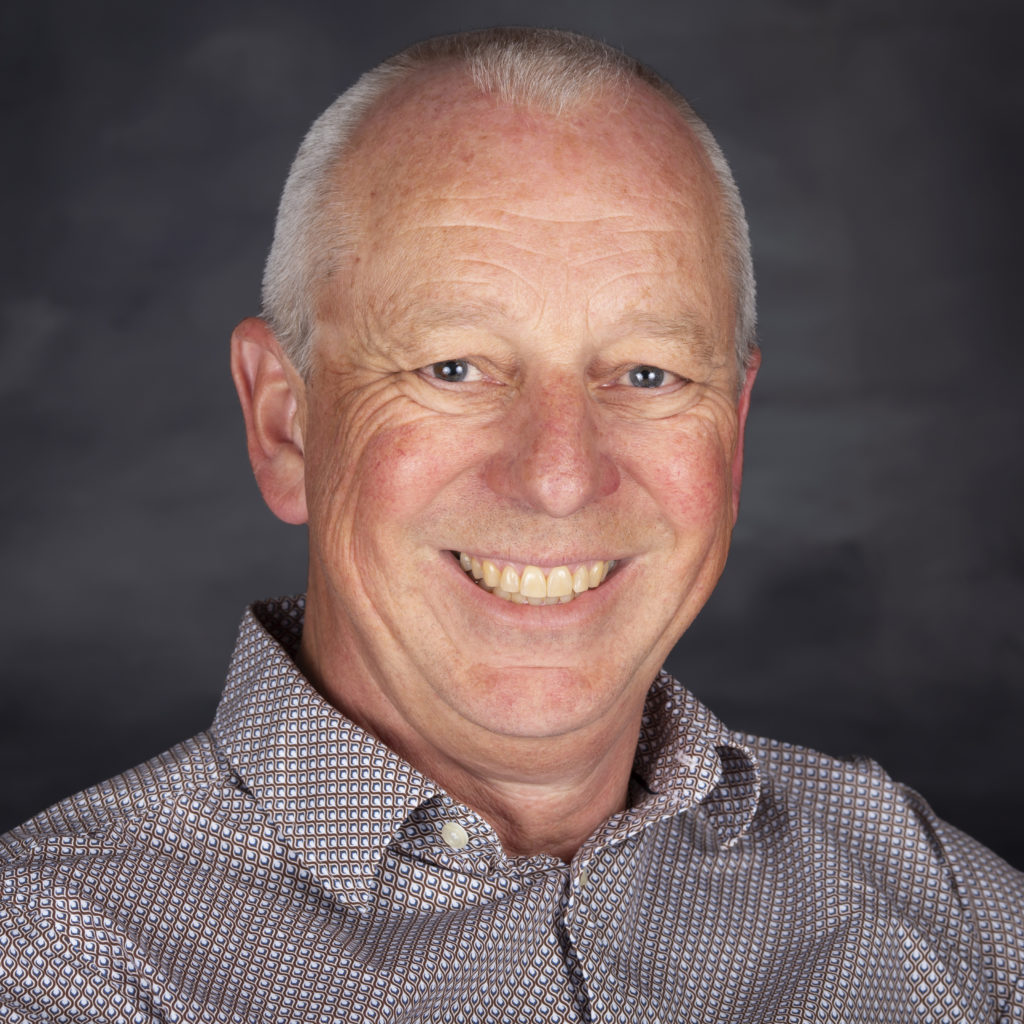
“Shibuya is part of IBM’s ecosystem and works as our proxy into IBM when it comes to consuming the service we use. Even though we have graduated from the startup program, we are still in close contact and they bring us into the game when it’s good timing.”
It’s not just the direct referrals that IBM facilitates but also the security of having the tech-giant behind them that helps SiB Solutions find new business. Stefan reflects that it has been a win-win collaboration for them.
“One main reason we decided to engage was that we would get much more hands-on assistance from them free of charge and they add security and value for our potential customers to know that there is certification around our solution.”
Tips for Startups
- Don’t rush, make sure you create a good plan and take it step by step
- Discuss and remove any deal breakers as early as possible in the process
- One of the biggest challenges for startups is knowing where to put your resources
- Have a growth mindset and be open to receive input and learnings from the corporate
- Be open to integrate IBM technology into your solution (where it makes sense from a technical and business perspective) as it can help foster a strong foundation for collaboration
After meeting last year at our Sustaintech event, CommuteSaver and Microsoft Sweden have joined forces to help companies measure the environmental impact of commuting and travelling for work.
The Swedish startup provides a fully automated CO2 tracking app that automatically detects the user’s transport mode (such as bicycle, public transport, car), which then tracks and reports those CO2 emissions to the company, together with data-based recommendations at the individual and office level to reduce emissions and costs.
By joining Microsoft’s Entrepreneurship for Positive Impact program, CommuteSaver gained access to a wide range of technology and opportunities, including becoming part of their Cloud for Sustainability product offer.
Learn more about their collaboration from CommuteSaver CEO & Co-founder, Martin Walian and Microsoft Sweden’s Sustainability Lead, Yalle Elehu in the video below.
After meeting through Ignite in 2018, the Swedish corporate Alfa Laval and startup Reliefed began a range of exploratory pilots that have grown into a long-term business relationship with new opportunities.
Alfa Laval focuses on separation technology, heat exchangers, and fluid handling solutions with a clear ambition to increase the sustainability of their products. When they met Reliefed, they were looking for new materials, ways to significantly reduce the carbon footprint of its products as well as improve manufacturing efficiency.
Reliefed developed z.trusion®, a patented 3D manufacturing technology enables the creation of 3D structures in a single process step and lead to large material savings. Together the companies began a Proof of Concept (POC) in 2019 to explore the utilization of alternative materials for existing applications in combination with the new design approach of the z.trusion® process. Alfa Laval financed the project, that had the potential to reduce the CO2 footprint of a specific product by 60%.
Three-Phased Proof of Concept
From the beginning there was a focus on exploring together with the establishment of an NDA and clear process for the collaboration; an important aspect for deeptech which requires long-term engagement.
“We divided the POC into three phases, spanning approximately two years. During this time, Alfa Laval paid for the work, while we designed together the tooling and prototyping. In certain cases, especially when working with some IT solutions, it is possible to achieve proof of concept within two or three weeks. But when it comes to deeptech, however, this two-year timeframe is relatively quick,” says Anders Nyander, Concept Project Manager at Alfa Laval.
This process was helped by having a clear understanding and communication between the two companies.
“It was very good that Alfa Laval had a well-defined process and structure for conducting projects like this, and that we have very clear goals in mind. It helped us allocate our resources and take this step by step,” says Lovisa Högberg, Head of Sales & Marketing at Reliefed Technologies.
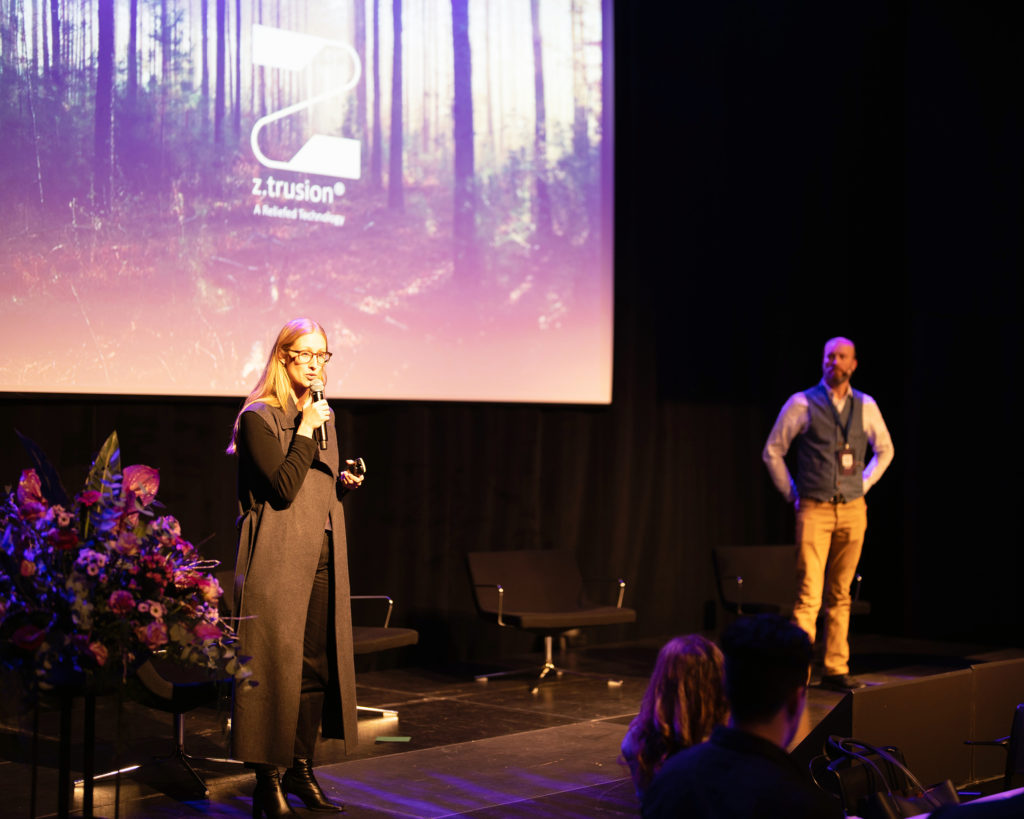
Developing an On-Going Relationship
This initial pilot project ended in 2021 with a successful validation and prototype that met the original goals of the collaboration but it also led to additional opportunities.
The companies are now conducting a spin-off POC to further explore the potential of the process technology for handling exotic materials that are very hard to handle with conventional technology, creating a pathway for further innovation and development
“We thought that with everything we had learned, it was possible to combine this technology for a spinoff of the POC. So now we are digging into another technology field as well, even more challenging and probably more avant-garde. We have just started the new POC, while we are also discussing some completely different collaboration possibilities within the emerging hydrogen market,” says Anders.
The pilots also allowed Reliefed to better understand what their technology was capable of and how it could be implemented.
“We have gained a lot of knowhow and maturity in-house on what we actually can achieve with the technology, which is also very positive for us as a startup,” adds Lovisa.
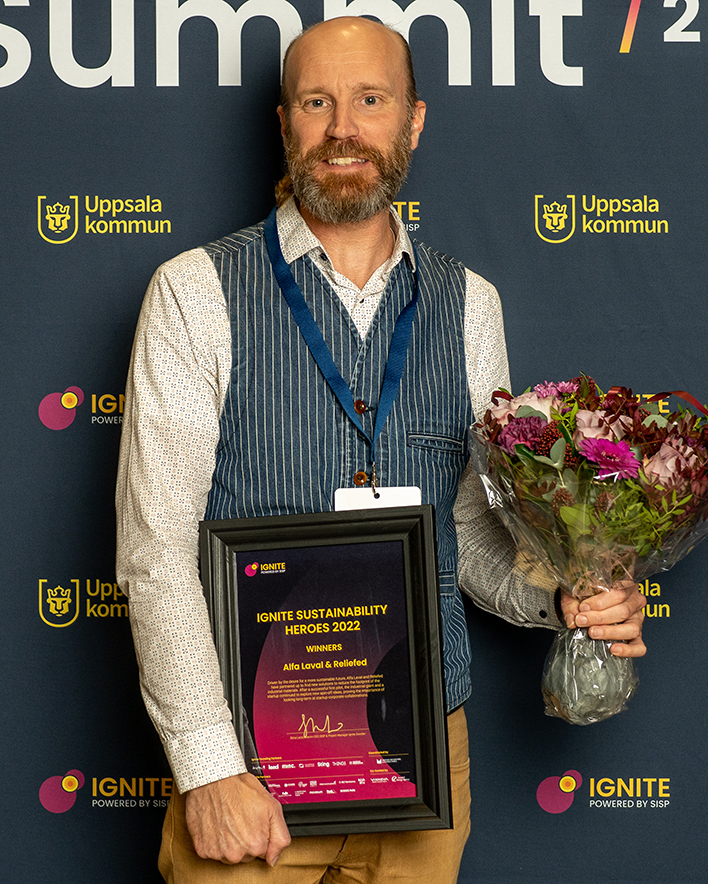
Secrets to Ongoing Success
Due to the long-term nature of deeptech that requires years of engagement, there are some important factors for success. Perhaps foremost of these is the need for open and honest communication.
“The ability to engage in open and candid discussions with Anders and his team fostered a straight-forward and honest working relationship, which we really appreciate. The letter of intent with Alfa Laval was also critical for us in terms of getting credibility as a startup, particularly with our investors. It also conveyed a sense of commitment and there is a buy-in from Alfa Laval to move forward if we achieve our intended results,” explains Lovisa.
For Anders, it is also important to note that these types of collaborations are rarely the same.
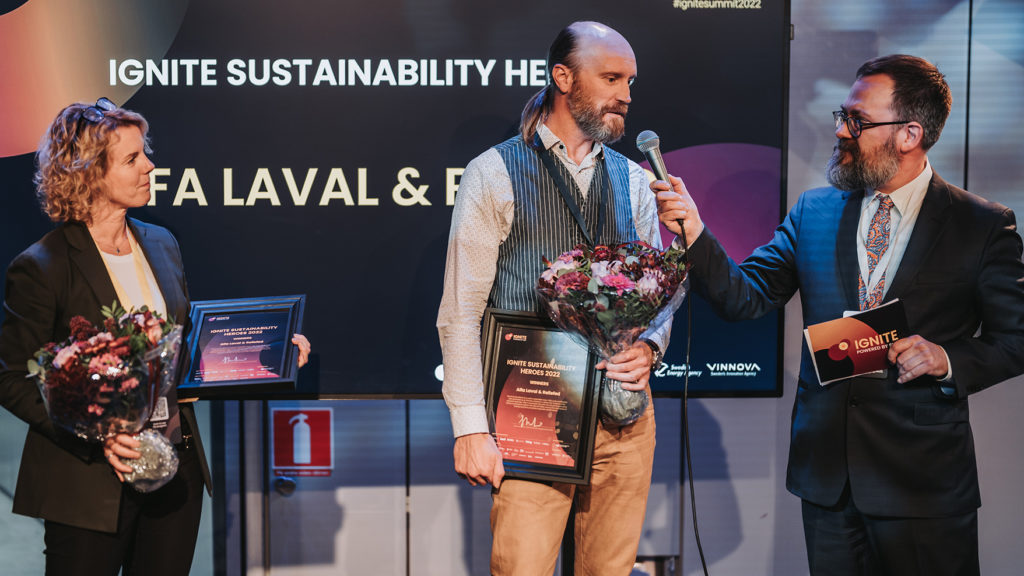
“Some collaborations can be very quick and intense, and others can take a long time and also be intense. The relationship between the companies can also vary. In this case, Alfa Laval is the startup customer, but in other cases Alfa Laval is the potential supplier to the startup.”
This ongoing collaboration highlights what is possible when both parties are committed to open communication, clear process and willingness to push boundaries and explore new potential as it arises for a more sustainable future.
Discover how Uppsala is collaborating with startups that have been matched through Ignite Sweden, along with its local innovation ecosystem, to achieve its climate-neutral vision by 2030.
Uppsala Municipality has set its sights on becoming not just climate neutral but climate positive by 2030. To achieve this ambitious goal, collaboration and innovation have become the cornerstones of Uppsala Municipality’s approach.
This collaborative approach combines the strengths of Uppsala’s startup sector, universities, and the municipality’s innovation system to address complex challenges effectively.
Mayor Erik Pelling recognizes the transformative potential of startups: “Startups are really important for us. Through them, we get access to new technology, new ideas, and new innovations. We see them as part of the municipality, as our own R&D department.”
“We collaborate very closely with our colleagues within the innovation support system. We have colleagues talking about innovation, sustainability, and how they can work together with startups based on our challenges,” says Annika Remaeus, Head of Unit Business & Development at Uppsala Municipality.
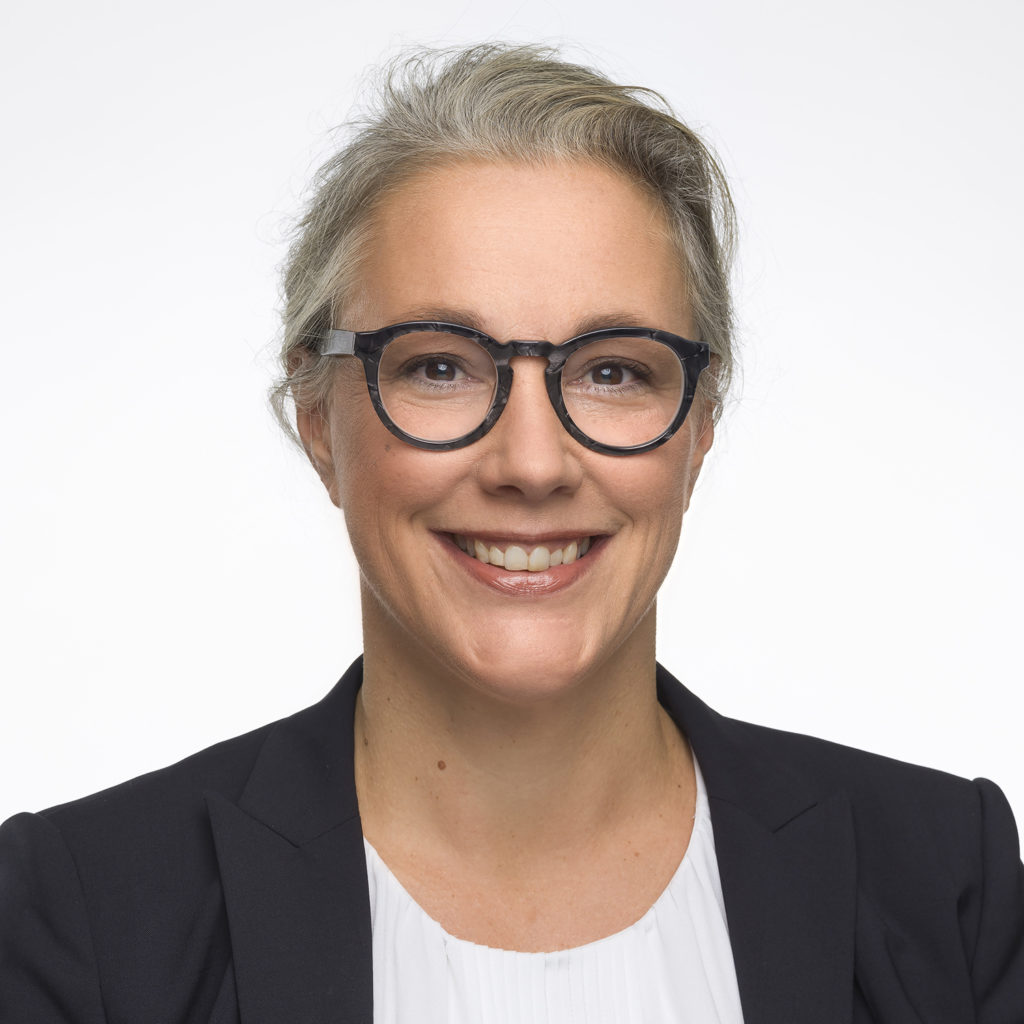
Connecting Startups with Uppsala’s Challenges
Through a fruitful partnership with Ignite Sweden, an initiative that connects startups with public sector needs, Uppsala is driving sustainable solutions, scaling up successful pilots, and inspiring other municipalities to join the movement.
By matching startups with the specific needs of the public sector, Ignite Sweden enables Uppsala to harness fresh perspectives and cutting-edge solutions to tackle sustainability challenges.
According to Ignite Sweden’s Innovation Process Leader, Marit Finch Westin, the aim of the matchmakings between startups and public organizations is to enable the testing of innovative solutions through pilot projects. These pilot projects serve as strategic tools that foster innovation and facilitate active collaboration between the public sector and startups.
“The process begins by identifying the challenges and then building upon them. It also provides valuable insights into internal innovation processes and encourages the organization to be more flexible and agile. This approach provides a starting point to initiate small-scale operational activities that can later be scaled up,” explains Marit.
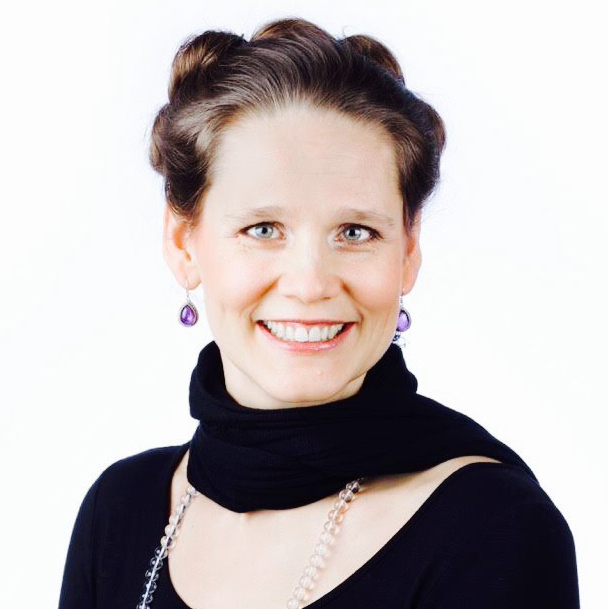
“We have worked with Ignite Sweden for more than four years. During this time, we have matched over 100 challenges and started numerous pilot projects that are now scaling and growing within the organization,” says Annika.
The Tvinn Case
One standout collaboration between Uppsala Municipality and a startup is the Tvinn case. Uppsala faced a pressing challenge concerning electricity capacity, which threatened the city’s sustainable growth.
“A few years ago, we realized we had a problem: the electricity would not be enough for the city to grow. We needed a number of technical solutions to fix this. Ignite Sweden helped us formulate a challenge that could be met by startups,” explains Linnea Nedar, Development Leader at the Municipality’s Sustainability Department.
With the support of Ignite Sweden, the municipality was matched with Tvinn (now called Recap Power), an Uppsala-based startup specializing in smart energy solutions.
Tvinn’s founder and CEO, Jonas Thyni, explains how their innovative approach could be applicable to Uppsala’s challenge.
“We had a solution for this that consisted of the possibility to create flexibility by monitoring and controlling different energy resources from different facilities, for example, heating pumps. This solution allowed them to reduce consumption at certain times when the grid had problems with capacity.”
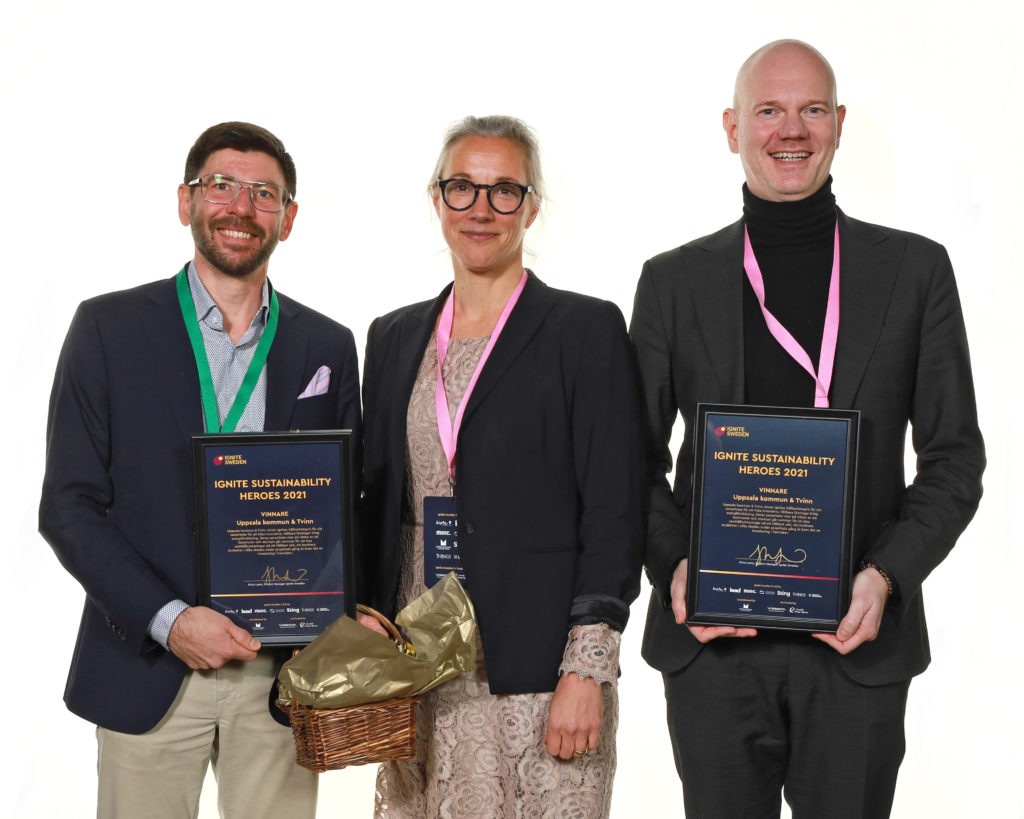
Scaling Up for Widespread Impact
Scaling up the successful pilots is a crucial step in Uppsala’s journey towards a sustainable future. By embracing collaboration and nurturing a culture of innovation, Uppsala Municipality is shaping a sustainable future not just for their city but for municipalities worldwide.
“We share challenges with a lot of other municipalities and cities, both in Sweden and around the world. We currently work with cities in Sweden to see if we can scale their solutions in our organization. We don’t know if we have exported any of our pilots and developments yet, but I definitely believe that there is significant potential for scaling,” recognizes Annika Remaeus.
Marit Finch Westin stresses the importance of sharing experiences with other municipalities and organizations facing similar challenges.
“Scaling is really important as numerous municipalities and organizations share similar needs. There is no need to reinvent the wheel repeatedly. Working together, sharing experiences and learning from each other is really important,” concludes Marit.
Watch Annika_Remaeus (Uppsala Municipality) and Marit Finch Westin (Ignite Sweden) talk about their collaboration at Sweden Innovations Days 2023
Take a closer look into Mimbly’s journey, from Chalmers Ventures’ support in the early stages to Ignite Sweden’s help in connecting them with their first corporate customer.
Mimbly focuses on creating solutions to make laundry more sustainable. They have developed the Mimbox, an add-on product for reusing water in washing machines.
The Gothenburg-based incubator Chalmers Ventures played a crucial role in their development, supporting the company during its early stages to transform their disruptive idea into a viable business.
“Mimbly was born at Chalmers Ventures’ incubator program. We started out there with basically an idea of being able to reuse water in washing machines. Chalmers Ventures helped us to create a company around that idea. We also got our initial funding from them,” says Emil Vestman, Product Development Manager and co-founder.
“We worked with Mimbly from the start and supported them with coaching in the product development process, but we also invested in them at that earliest stage where most private investors deem it too early and too risky to enter,” explains Charlotte Emlind Vahul, Head of Business Coaching at Chalmers Ventures. “Our support provided the initial spark that helped the company take those critical first steps on their journey towards creating and launching their product.”
First Customer Through Ignite
As the product development process continued, Mimbly reached a critical point where they had proof of concept. It was at this point that they connected with Ignite Sweden, an initiative that connects startups with established companies and public sector organizations.
Through Ignite Sweden, Mimbly was introduced to Coor at a matchmaking event that took place in Borås in 2018 during SISP’s annual conference, Sveriges Innovationsriksdag. The facility management company became a significant partner in Mimbly’s journey towards launching their product.
Their collaboration didn’t begin until a year later when Mimbly was awarded the 2019 Kommersialiseringspriset (Commercialization prize) by the Swedish Energy Agency, InnoEnergy and Ignite Sweden. This prize, awarded at the Power Circle Summit, allowed them to begin a one year pilot project in June 2019 at Coor’s head office in Kista.
Since then, their collaboration has flourished and led to the signing of a frame agreement last year to install their product, the Mimbox, across Coor’s sites in the Nordics.
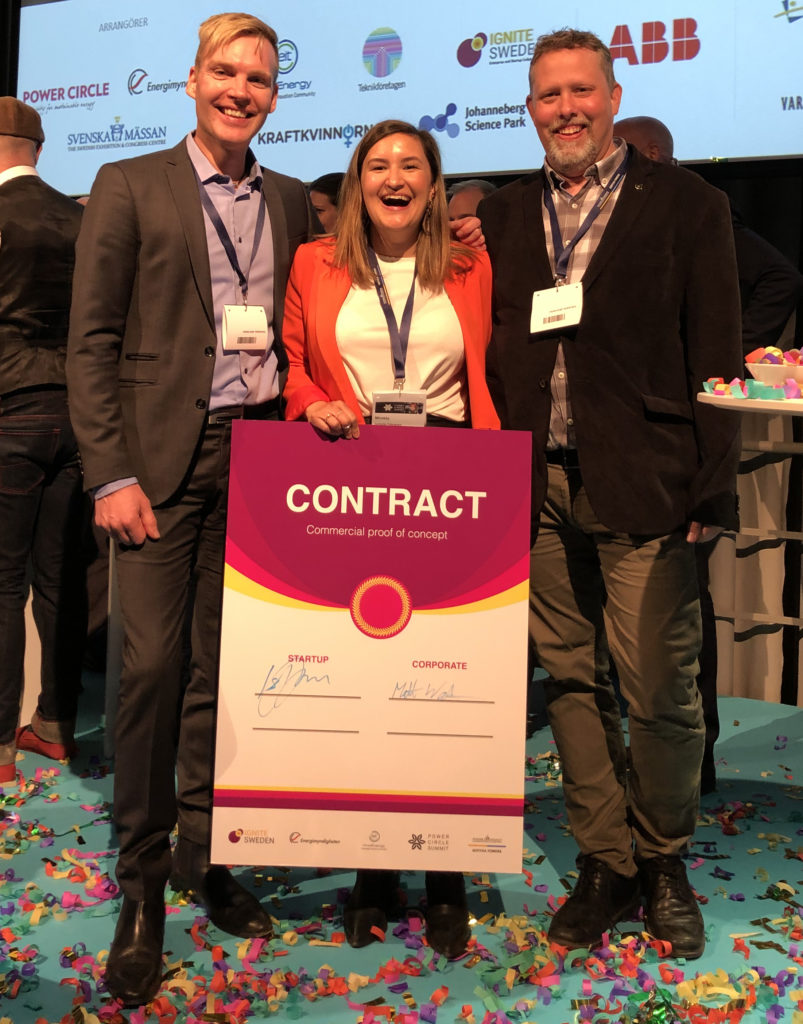
Startup Success Through Innovation Ecosystem
Emil recognizes that he wouldn’t have thought they would be where they are today, not even in his “wildest dreams”.
“I jumped into this with just an idea, not really knowing what it was going to become. Mimbly has grown, and we, the people working at the company, have grown with it. Now we can actually see what we have accomplished,” says Emil.
Mimbly’s story is a great example of what can be achieved when startups receive support from various actors within the Swedish innovation ecosystem.
“There’s a saying: ‘it really takes a village to raise a child’, but it takes a whole innovation ecosystem to support and raise a startup to create commercial success,” concludes Charlotte.
Watch the video on Mimbly’s journey
In collaboration with the Uminova Innovation’s startup Umigotech, the municipality has recently launched the Digital Senior Center, which aims to contribute to a more active and healthy senior life.
The new Digital Senior Center (“Digitala Seniortorget” in Swedish) is a web-based platform where seniors can find activities around Umeå.
“Collaborating with seniors and partners to provide inspiration and information for healthier aging is a win for both individuals and society. The Digital Senior Center is just one example of the many inspiring initiatives we arrange for promoting healthy aging. Through these initiatives, we all stand to benefit,” explains Camilla Jägerving Isaksson, Process Leader in Elderly Care, who led the project.
Sofia Eriksson was part of the working group behind the development of the Digital Senior Center as project manager for Umeå’s Navet swimming center’s senior initiative. She sees the new platform as an opportunity to reach more seniors who may not yet be aware of the activities they offer.
“The Digital Senior Center will make it easier for seniors in Umeå to find us and feel encouraged to try our activities,” she says.
Matched Using Ignite Public’s Process
Ignite Public is Ignite Sweden’s process for matching public sector organizations in need of innovative solutions with startups. This process was developed in collaboration with startups, municipalities, regions, incubators, and science parks across Sweden.
Uminova Innovation, one of the incubators that founded Ignite Sweden in 2017, used the Ignite Public process to match Umeå Municipality with startups that could help them develop this idea.
One of the startups that the municipality was matched with was Umigotech, which they met during a matchmaking meeting in June 2022. Since then, they have been working together on the development of the new Digital Senior Center.
A Digital Platform with High-Impact Potential
Umigotech’s founder, Per Levén, emphasizes that the digital platform was developed to make it easy for organizers to add activities.
The Uminova Innovation startup specializes in creating versatile tools for building customized platforms that can be applied to a wide range of fields and industries.
Umigotech’s next step is to offer the platform to more municipalities.
“We will soon launch a meta-platform so that more municipalities can test the platform. The technology can be used for a lot of different purposes and target groups, so I hope there is interest out there.” concludes Per.
Creating a pilot project gave Lindab the evidence and confidence to expand their work with startup Mavenoid and move towards a full rollout of their solution.
After broadening their offerings to include technical products with more software and electronics than their previous ones, the leading ventilation company Lindab was looking for new digital support solutions. They needed a tool that would help consolidate their data and streamline the channels on which their customers were asking for help.
At Ignite Deeptech, the first digital matchmaking held by Ignite after the pandemic outbroken in March 2020, Lindab’s Head of Innovation Hub, Nicklas Friberg, met Mavenoid.
The Stockholm-based deeptech startup has developed a human-friendly, AI-guided product support.
After their meeting, Nicklas thought that Mavenoid’s solution could solve their needs. However there was an internal challenge to get people to agree to begin the process of working with a startup.
“When I tried to actually turn it on the collaboration, I spent about six months speaking about this internally. It was very awkward because everyone realized this was a great thing, but not for us,” says Nicklas.
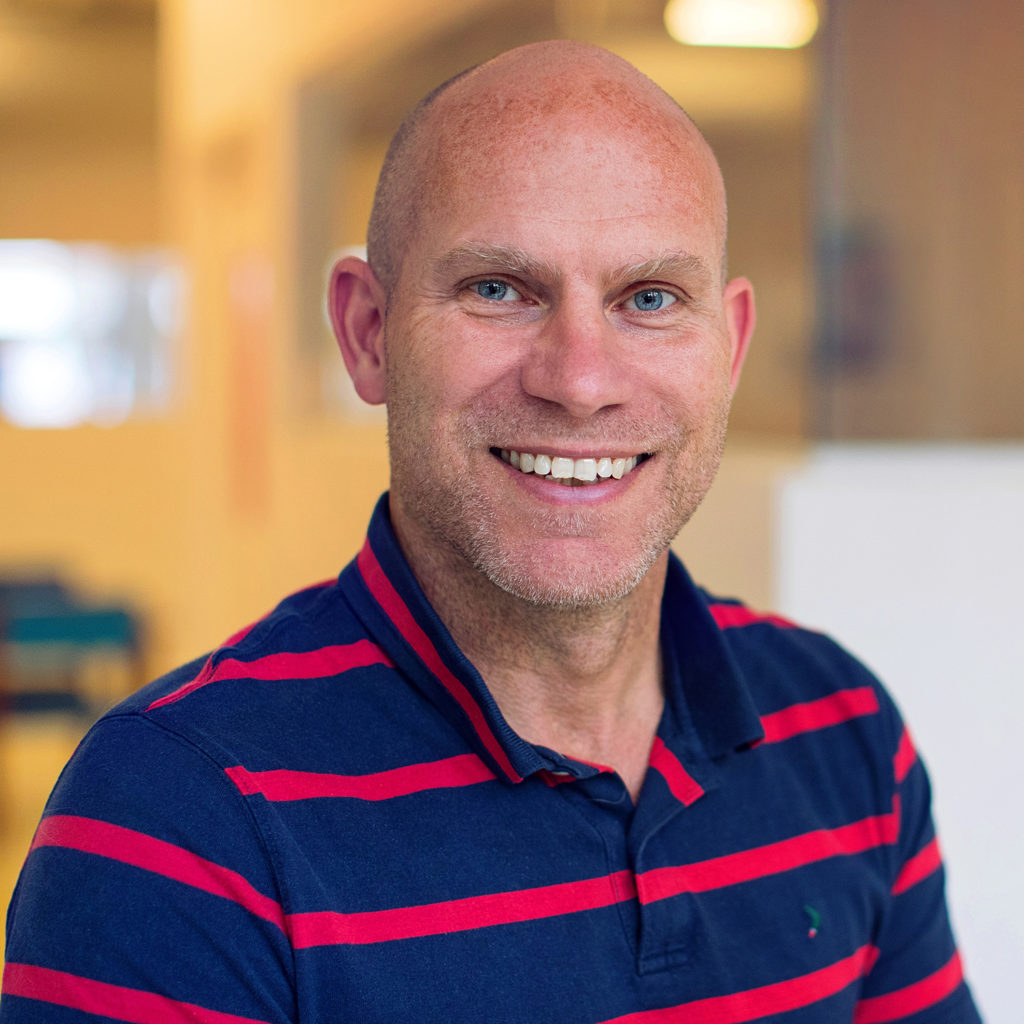
From First Meeting to Pilot
As this internal conversation was happening, Nicklas took a leap of faith and asked Mavenoid to begin a pilot project with them as a way to prove that it could work for Lindab.
“Once we got the pilot in place, then everybody said ‘oh this is the thing we should do, it’s obvious.’ So we kind of forced an internal decision and after that it was very quick. Seeing is believing and it was very crucial for us there and very useful,” explains Nicklas.
For Mavenoid it was also important to define the pilot and ensure there was potential for future expansion within the collaboration.
“I did spend quite some time on the scope of the pilot to make sure this didn’t become a giant project that never ends. But we had the material we needed in order to move quite fast and I think that speaks volumes to both of us, that once you have the right things in place you can actually move forward quite quickly,” says Tilda Sander, Head of Growth & Partnerships, at Mavenoid.
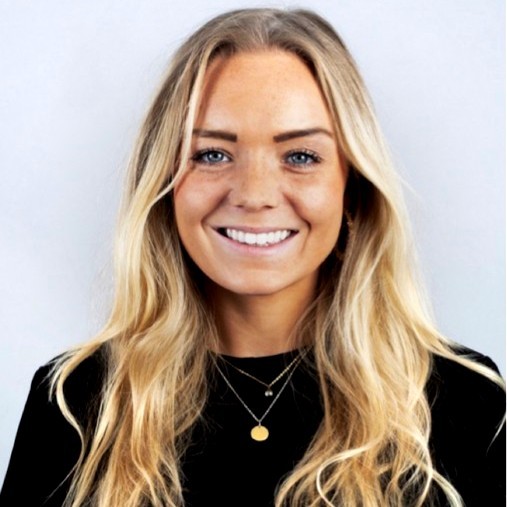
From Successful Pilot to Rapid Rollout
In just six weeks, Lindab was able to revise their end-to-end support process and establish a clear understanding within their organization on how to interact with their customers and users in a more user-friendly way.
The fast movement from pilot to roll out is even more impressive as it was an entirely new product that they created together.
“There was a lot we didn’t really know, as we didn’t have any existing interactions with the customers, so we didn’t really know what customers would ask about. So it has been a huge learning for us and we became better through working with Lindab,” says Tilda.
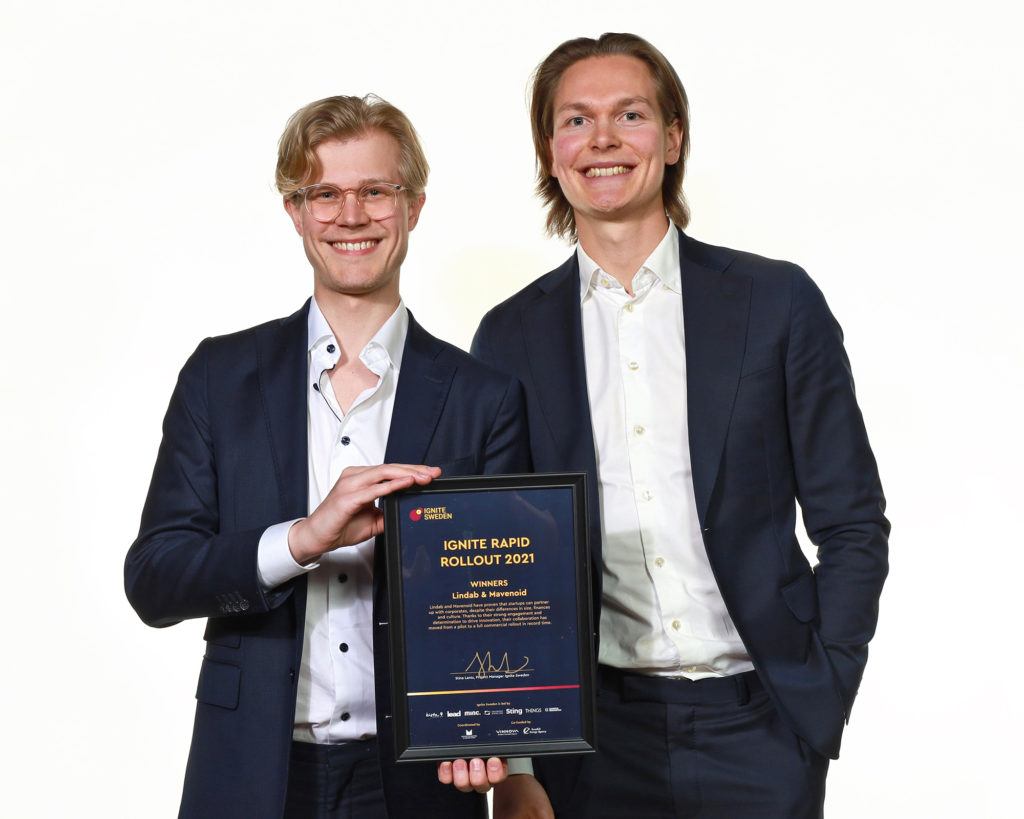
Since beginning the pilot in December 2020, Mavenoid has expanded within Lindab to work with two more business units and is looking to implement their support system into other channels such as the Lindab website.
For other corporates looking to work with startups to solve their innovation challenges, Nicklas had some clear advice.
“The lessons learned for us have been very strongly linked to the internal selling process. It’s really about just deciding just to do it and as always involving the right stakeholders early.”
Due to its fast expansion and impressive rollout, Lindab and Mavenoid were awarded the Ignite Rapid Rollout award at Ignite Sweden Days 2021.